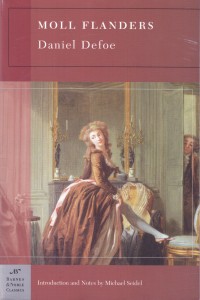Moll Flanders by Daniel Defoe (2005. Barnes and Noble Classics. ISBN 978-1-59308-216-1)
One of the classics or it wouldn’t be included in B&N’s trade paperback library, right? Well, Moll Flanders appears to have been included in the bookstore giant’s series of “great” novels because, as the editor of the B&N edition of the novel writes:
If we define the novel in the way we are used to thinking about fiction-as a prose narrative of substantial length that makes a pretense of reporting life in a form human beings might well have imagined to have lived it-Defoe surely stakes a claim as the first English novelist…
(p.xiii, ibid, Michael Seidel)
Purported to be, as the subtitle states, The Fortunes and Misfortunes of the Famous Moll Flanders (a fictional biography of a woman born to poverty in Newgate Prison, whose only chance, as a child, of a safe and honorable upbringing disappears like morning vapor on a Welsh moor) this book attempts (to recreate in fiction) depictions of English poverty and class disadvantage painted far more honestly and credibly by Charles Dickens in Oliver Twist and Bleak House. Now, some might argue the book’s failings arise from the language Defoe wrote in: late 17th and early 18th century English, a form of English that is so archaic, so outmoded that four hundred years later the language itself is the main issue with the novel. I would disagree. Think of more recent works of fiction, such as Their Eyes Were Watching God by Zora Hurston. That novel is embedded with a twisted distortion of English derived from the Deep South that many might find difficult, if not impossible, to negotiate. And yet, to this day, Their Eyes retains its vigor and its passion as a great read. Certainly, the distance of time makes works of fiction less relevant. And certainly, in comparison to Moll Flanders, Their Eyes is a relative newborn. But in the end, I have to disagree that it is the language of Defoe’s novel that makes the book less than satisfactory.
A great novel, whether contemporary, literary, science fiction, or romance lives or dies upon the shoulders, broad or narrow, of its plot and characters. And that’s just it: In my view, the shoulders that this story rests upon are too narrow to carry the weight of the book’s narrative. There are far too many coincidences, too many pat plot devices, too many escapes from the noose experienced by Moll Flanders along the way to make the story ring true. Would, at a time when children were executed for stealing, a matronly thief (with a long history of deception, prostitution, lies, thievery, and other law-breaking) really escape the noose as Moll does towards the end of story? (This isn’t a spoiler alert: Since the book is written in first person, we know from page 1 that Moll will survive her travails.) Doubtful. This is but one of many, many purported “ah ah” moments in the plot that seem contrived. Then there is the character of Moll herself: One moment seemingly honest and hard-working and ready to redeem herself, and the next, ready to steal from the house down the street. Complex characters are great: No villain is totally evil and no hero is totally good. But if a character is to possess such multiple layers, these nuances need to be explained in context and revealed in depth. Such revelations do not occur (with respect to Moll’s character) in the book.
Overall, this novel amounts to a chronicle of an incident-driven fictional life with little, if any, genuine exposition of character.
3 stars out of 5.



